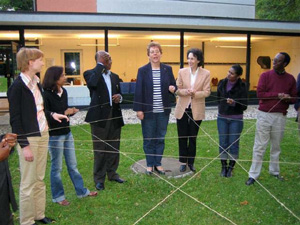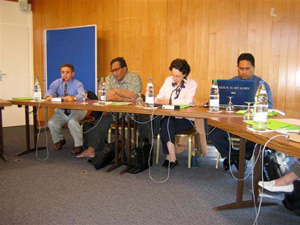
Issue No. 2
August 2006
Dear brothers and sisters in Christ.
"Grace to you and peace from God our Father and the Lord Jesus Christ" (2 Tes. 1:2).
We are pleased to share with you in this current issue of the Ecumenical Letter on Evangelism, the relevant documents of two mission and evangelism related events which we attended recently.
The first event was the seminar "Mission as Proclamation of the Gospel. Towards a New Ecumenical Agenda for Evangelism in the 21st Century", June 6-12, 2006, which was jointly organized by the Ecumenical Institute in Bossey and the WCC Mission and Evangelism programme.
As you can read in its final Message, among the elements of a "new ecumenical agenda on evangelism for the 21st century," the participants suggested, the launching of an Ecumenical Decade for Common Evangelism (2010-2020), and an "inclusive, diverse and participatory" process of planning for a the centennial celebration of the 1910 World Mission Conference in Edinburgh. In the context of this celebration, they also suggested staging "a huge international ecumenical youth evangelization festival".
The other event was the second Assembly of the Council for World Mission (CWM), which met in Ocho Rios, Jamaica from 18-27 June 2006, hosted by the United Church in Jamaica and the Cayman Islands (UCJCI).
We hope that you find these materials useful for your ministry.
Please remember that this issue of the Ecumenical Letter on Evangelism and the previous ones can be found electronically on the following section of the WCC’s website: http://www.wcc-coe.org/wcc/what/mission/evlet-index.html
Evangelistically yours,
Carlos Emilio Ham (cah@wcc-coe.org)
WCC Program Executive for Evangelism.
Report of the Bossey Seminar
“Mission as Proclamation of the Gospel.
Towards a New Ecumenical Agenda for Evangelism in the 21st Century”
Ecumenical Institute Bossey, June 6-12, 2006
1. Introduction – Purpose of the Seminar The seminar, held at the Ecumenical Institute Bossey, on the theme “Mission as Proclamation of the Gospel. Towards a New Ecumenical Agenda for Evangelism in the 21st Century”, June 6-12, 2006, was jointly organized by staff of the Ecumenical Institute Bossey and the WCC Mission and Evangelism programme. It brought together representatives of WCC member and non-member churches from all the regions of the world. The theme and purpose of the seminar were defined in the following announcement: |
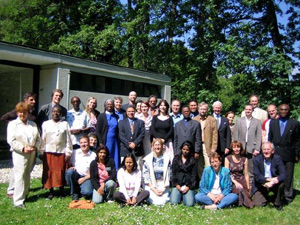 |
The CWME Mission Conference in Athens, Greece (May 2005), highlighted mission as participation in the ministry of healing and reconciliation. Among the challenges which need further work is the role of the proclamatory aspect of Christian witness and church life. This Bossey seminar aims at specifying content and methodologies of evangelism in an ecumenical perspective. The seminar will look at questions like:
- How and where is the gospel to be shared in a religiously and culturally plural world?
- What are effective means of proclaiming the gospel in the 21st Century?
- Which of these bring about reconciliation?
- What are the dynamics involved with the signs of healing that accompany such sharing?
Drawing on the results of both the Athens Conference and the WCC 9th Assembly in Porto Alegre (February 2006), these are some of the questions which will be addressed by the seminar.
Exploring the way towards a new ecumenical agenda for evangelism in the 21st century is an urgent imperative in many regions of the world as well as in the global ecumenical movement. In addition, Evangelism is an important component, as WCC seeks to broaden the vision of ecumenism with the participation of non-WCC member churches.
2. The Programme
In general, the programme flow was the following: in the mornings, we began with prayer and Bible study, both led by different participants. The mornings were mostly held in plenary sessions, during which case studies on evangelism from various church traditions and socio-political or cultural contexts were presented. The afternoons were divided into two main parts. First, participants met in groups providing the opportunity to dialogue with the resource people who had made the presentations in the morning, followed by a plenary session for further debate. In the second part of the afternoon, we received new inputs on specifically chosen subjects. Short evening sessions allowed different participants to share their ‘Journey of Faith’ (a personal testimony). The day closed with evening prayer.
3. The Participants
There were thirty-six participants, coming from all the continents (except South America). Confessions represented were: Roman Catholic, Lutheran, Presbyterian and Reformed, Pentecostal, Baptist, Methodist, Free, Episcopal and Anglican and Orthodox. Even though the Orthodox were represented, a wider representation from the different traditions would have been desirable.
Among the participants we highlight the presence of The Rev. Dr. Simon Kossi Dossou, the WCC African President, from the Methodist Church of Benin; the Rev. Christoph Anders, newly elected General Secretary of EMW in Hamburg; Bishop Sandy Millar, founder of the Alpha Course, from the Church of England, and Bishop Pie Ntukamazina, from the Anglican Church in Burundi.
4. Conclusions and outcomes
The participants' assessment of the seminar was very positive. There was an excellent spirit of cooperation and commitment. The consultation proved to be a good example of how possible controversial issues, such as mission, evangelism and proselytism, can be discussed with an open mind and common spirit.
The quality of the presentations, given by very well-known scholars, was very high. At the same time we addressed many topics from a practical and pastoral points of view.
The event is a good example of cross-team collaboration in times when we are trying to encourage this working style in the WCC. This fact was even more meaningful in this moment when Bossey is going through a process of shortage of staff.
A Reflectors' Group was appointed. Their reports are available upon request.
We are grateful to God and to all the participants, in particular to the resource persons and staff, for such an encouraging and instructive event.
The following message, which includes recommendations, was discussed and received by the participants of the seminar:
Message from Bossey Seminar "One night the Lord said to Paul in a vision, 'Do not be afraid, but speak and do not be silent; for I am with you, and no one will lay a hand on you to harm you, for there are many in this city who are my people.' He stayed there a year and six months, teaching the word of God among them" (Acts 18: 9-11 - NRSV). We have been greatly enriched by participating in the WCC seminar “Towards a New Ecumenical Agenda on Evangelism in the 21st Century” which took place at the Ecumenical Institute of Bossey, 6-12 June 2006. It was both timely and a unique opportunity that the first major international study seminar of the WCC after Porto Alegre focussed on evangelism. We not only brought together what the world mission conference in Athens and the WCC assembly in Porto Alegre said in terms of unity in mission and evangelism, but also highlighted key themes and issues for ecumenical cooperation in evangelism for the 21st century. Thirty-six representatives from member churches as well as non-member churches of the WCC attended the seminar.
In evaluating the strategic importance of this international ecumenical seminar at the beginning of a new working period of the WCC, and at the beginning of the new millennium, we would like to affirm the following convictions and proposals: - Ecumenical cooperation in Evangelism should regain a high and visible priority in the working structure and study programme of the WCC in the post-Porto Alegre period. We are convinced that approaching the 100st anniversary of the world mission conference in Edinburgh in the year 2010 a common commitment to recapture the passion for evangelism for the future generation of ecumenical and church leaders lies at the heart of the ecumenical purpose altogether. On the other hand, without giving evangelism a proper priority and prominent place in the work of the WCC, the urgently needed broader ecumenical approach and collaboration with non-member churches in both the Pentecostal and charismatic, and the evangelical tradition (which is also a driving force behind proposals for a Global Christian Forum) would be hindered in the future. A common concern for evangelism is a key theme and a strategic bridge for ecumenical cooperation between WCC member churches and the majority of non-member churches in the 21st century. - We strongly encourage plans be made for an inclusive, diverse and participatory process of preparing for the 2010 centennial of the world mission conference in Edinburgh. This is a unique chance for bringing together again the dual commitment for Christian unity – even beyond the present constituency of the WCC - and the passion for world evangelization in the changed context of the 21st century. - As the WCC has done a great work in putting together key documents on a common understanding of mission (collection of key documents on mission 1980-2005 produced for the 2005 Athens Conference on World Mission and Evangelism), we would encourage the WCC, in cooperation with other bodies (like IAMS), to project also for an international ecumenical textbook on evangelism to be made available on the occasion of the centennial in 2010. An international ecumenical textbook on evangelism should be produced for religious colleges, universities and theological institutions in general in order to more strongly include issues of evangelism in theological education and the formation of ministers in member churches and beyond. This international textbook on evangelism could contain key documents on evangelism from WCC history, major surveys on the understanding, models and practice of evangelism in various major Christian traditions including those not formally associated with WCC and perhaps a new convergence document on the meaning and ecumenical horizon of evangelism in the beginning of the 21st century. - We were also very much concerned about the future of evangelism among youth and young adults that has been so prominent in the formative period of WCC and has been affirmed and highlighted in the most recent Athens Conference on World Mission and Evangelism. Also in Porto Alegre 2006 the participation of youth in the future of the ecumenical movement as a whole was very much highlighted. We would like to propose that in the preparatory process towards the 2010 centennial of Edinburgh a huge international ecumenical youth evangelization festival should be considered and planned for. An international ecumenical youth evangelization festival which would bring together several thousands of Christian youth and key people from vibrant and active youth networks from churches in the South and the North should accompany the official conference or festive event for 2010. If in the midst of the old European context, which has been heavily struggling with processes of de-christianization and secularization, a massive international youth evangelization festival could take place, which would bring back the flame and passion of evangelization for a new generation to carry on the task into the 21st century, this would be a proper expression of faithfulness to the very origins of the ecumenical movement. All major Christian bodies and regional ecumenical organizations should be invited to participate in its planning. If the World Council of Churches, the Lutheran World Federation, the World Alliance of Reformed Churches, the Council for World Mission, the Orthodox Syndesmos-Youth Network, the European Ecumenical Youth Council, the World Student Christian Organization, the World Evangelical Fellowship, the Charismatic Leaders Conferences, the Roman Catholic Church as represented in the Council of European Bishops’ Conferences (CCEE), and many other organizations and networks would cooperate in this regard, this would really be a visible sign of strength and renewed ecumenical commitment. With this project and in cooperation with many others, the WCC could also in public inspire a new generation at the beginning of this century and could rally some enthusiasm for continuing the missionary and evangelistic purpose it was founded for. The international ecumenical youth evangelization festival (IEYEF) could work as a “kick-off” for other simultaneously run evangelism youth events in different major places and cities in Europe and other continents.
Projects like these could also be seen as one first visible and practical expression of the envisaged Global Christian Forum which can gain momentum if it develops an inspiring project also for the future generations of Christian leaders in mission and ecumenism in the 21st century. - We also encourage that the materials of the seminar on a new ecumenical agenda for evangelism in Bossey should be made available for further use in WCC publications and communication spaces, such as the International Review of Mission (IRM), the Ecumenical Letter on Evangelism (ELE), the WCC website and the Ecumenical Network of Evangelists (in ecuspace.net). - We suggest to continue organizing more Bossey seminars on ecumenical evangelism in the years leading to the 2010 centennial and beyond as a high interest was expressed to keep this unique ecumenical institute as an important international platform for mutual learning processes in evangelism between member churches and non-member churches in the 21st century. - We also suggest to draft a press release on our Bossey Evangelism seminar and to make its results (Reflectors Report and Recommendations) widely known in international ecumenical, evangelical and charismatic circles. - We put forward the request to celebrate the Peace Conference, approved by the Porto Alegre Assembly to end the Decade to Overcome Violence (DOV), in the year 2011, in order not to overburden the year 2010 with too many major events. The participants of the International Bossey Seminar |
CWM Assembly Statement
The second Assembly of the Council for World Mission (CWM), bringing together 140 delegates from the 31 member churches and 6 global ecumenical partners, met in Ocho Rios, Jamaica from 18-27 June 2006. The event was hosted by the United Church in Jamaica and the Cayman Islands (UCJCI) and was preceded by gatherings of youth and women. Setting the scene Assembled as a global community of churches, we reflected on our present work and on the mission direction to which God is calling us at this time under the theme of “take home the good news”. We affirmed that God’s mission, rooted in the life and witness of our Lord Jesus Christ, must address concretely the challenges and opportunities presented by our different contexts. |
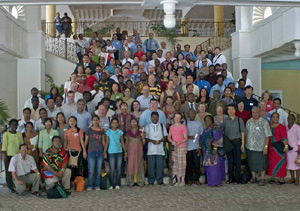 |
The Assembly affirmed that the Church is called to proclaim the good news ecumenically, in dialogue, in common witness, in collaboration and in a spirit of humility so that ‘the world may believe’ (John 17:21). We acknowledge that our divisions are in direct contradiction to the unifying witness of the gospel.
Under the guidance of the Holy Spirit we sought wisdom and direction in positioning ourselves as CWM to rise to the awesome challenge of the 21st century, of human suffering and destruction of nature and our environment. The Assembly also considered:
- the relationship between gospel and culture and the quest for new ways of following Jesus together
- a resurgence of religious fundamentalisms
- the emergence of increasingly diverse religious and pluralist societies
We acknowledge our dependence on God’s grace and guidance as we seek to give substance to our calling.
In our deliberations we identified the following major strands:
- the definitive nature of the local context in the church’s ministry and mission;
- the necessity of equipping the local congregation as the primary agent of mission;
- the importance of home and family;
- the relationship between healing and reconciliation;
- the translation of the major global challenges into locally relevant forms.
Shared experience
The Assembly was inaugurated with an exuberant and inspiring opening service of worship, in which the colourful and creative talents of the Caribbean were fully brought to bear on the occasion. With the Assembly theme forming the backdrop for all activities, the daily worship services featured meditations that explored the spiritual depth and breadth of the theme. The daily Bible studies with their emphasis on contextual reading, interpretation and application of Scripture, helped the Bible to speak to us in a new and powerful way. We recognise that more care should be taken to ensure that all the diverse constituencies are heard and understood, and that new ways of working together are found which enable participation of all. The Assembly nonetheless affirmed the God-given unity of the CWM family, and acknowledged that this gift was to be valued, cherished and nurtured. We celebrated the fact that CWM is a place where the pattern and style of engagement is personal, communal and pastoral, and that our journey together is as important as our destination. |
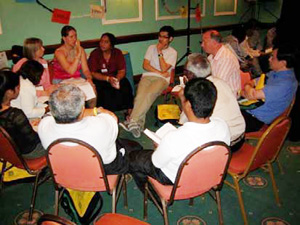 |
During the last Assembly we identified globalisation and economic justice, HIV and AIDS, interfaith relations, gender justice, care for the environment and new ways of being church as priority issues. There is still a need to address these in greater depth.
Declaration
We declare our ongoing commitment to the “Great Commission of our Lord Jesus Christ” (Matt 28 verses 16 - 20 and Acts 1 verse 8), and to the embodiment of mission through transformation, reconciliation and empowerment. To this end:
- We celebrate our common life as both hearers and bearers of the good news in our global, regional and local contexts.
- We commit ourselves to the interfacing of gospel and culture as we seek new ways of following Jesus together.
- We acknowledge that mission ‘embraces’ local knowledge and local contexts and that the good news is already embodied locally.
- We commit ourselves to deepen the relationship with our global, regional and local ecumenical partners.
- We affirm anew the conviction that the gospel invites all persons to experience fullness of life (John 10 verse 10).
- We pledge ourselves to a faithful prophetic and compassionate pastoral approach in pursuit of God’s mission.
- We therefore commit within the next three years, to:
- building up family life, with special reference to the abuse and violence towards women and children
- enabling and equipping young people to learn, grow and participate fully in the life and work of CWM at every level
- building women’s capacity and potential to exercise mission and ministry, despite economic, cultural and educational discrimination
- addressing issues of masculinity and male concern
- building capacity to respond to economic poverty and deprivation
- promoting an environment of openness, mutuality and reciprocity in regard to interfaith relations
- strengthening ministries of health and healing, with particular reference to HIV and AIDS
- giving urgent attention to ecological and environmental stewardship
- developing a ministry of sharing with the stranger in our midst (including migrant communities)
In recognizing the local church as a primary agent of mission, the Assembly calls on CWM and its constituencies to be more intentional about facilitating leadership development in the local congregation and resourcing churches to work together locally and regionally.
|
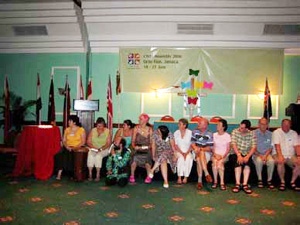 |
We celebrate, affirm and commit ourselves to the foregoing because of the conviction that the people of God in every local community around the world, however poor, weak or disadvantaged, are an integral part of God’s mission for challenging and changing all that denies people fullness of life.
Ocho Rios, Jamaica
26 June 2006
We invite you to pray for the WCC Central Committee which meets for the first time since it was elected last February by the 9th Assembly of the WCC in Porto Alegre, Brazil. The Committee will meet in Geneva from 30th August to 6th September. Its main tasks will be to decide on programme plans and a reconfigured organizational structure for the Council, as well as to appoint a series of advisory bodies.
The Committee is expected to consider a number of issues, including just trade, the plight of children in conflict situations in Africa (with particular focus on Northern Uganda), HIV/AIDS and the current crisis in the Middle East.
During these days, a public event and a consultation on the theme "Acting together for transformation" will commemorate the 40th anniversary of a landmark 1966 WCC World Conference on Church and Society.
For reflection: "We often hear the phrase ‘no news is good news’. When our lives are dominated by a media which considers the ‘good news’ no news, our great challenge as disciples of Christ is to make the ‘good news’ a relevant news to transform the lives of people today". |
